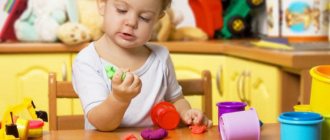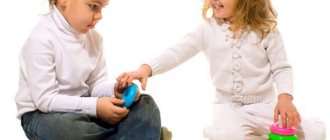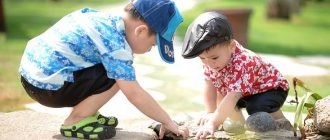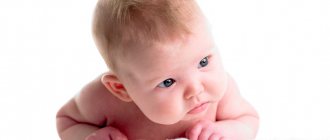Young children perceive a large amount of information very quickly. Ease of perception helps to unobtrusively, in a playful way, teach them speech skills. Early training gives remarkable results. Using the correct methods of speech development indicated in the article, you can achieve serious success: teach you to correctly pronounce sounds, understand and use a large number of words. Based on these skills, kids learn to construct short phrases and make simple conclusions.
- Chatter Poems
- We practice understanding and pronunciation of words. Items
- Speech therapist advice
What is “early development”
What is “early development”
Early development is the cognitive, emotional, social, and physical development of a child from birth to 3 years. At this age, the baby's brain develops at an extremely rapid pace. Until the age of three, intelligence appears, speech functions and mental activity develop. Later, the pace of development gradually decreases, and after 10 years, lost opportunities cannot be made up.
It follows that the age from birth to three years is considered the most productive period for the full and comprehensive development of a child. According to psychologists, during this period the foundation for future adult success in various fields of activity is laid.
Speech development in children
Today there are four groups of speech training: from birth, up to 6 months, from six months to a year, from 12 to 18 months, from 1.5 years and until the age of three.
From 0-6 months After birth, the child does not quite understand the sounds made by those around him, since his hearing and vision are just beginning to adjust. Later, the baby begins to respond to the words of adults with a smile. Already at 6 months, the child understands what mom and dad say.
From 6-12 months A baby who is older than 6 months learns to listen, and he has a desire to repeat what he has heard. In order for the baby to speak faster, experts recommend that parents play musical fairy tales more often, but their duration should not be more than 12 minutes.
When the fairy tale is constantly repeated, the sounds and words that sound are laid down in the baby’s memory. In addition, parents are advised to constantly name objects that come into contact with the child so that he understands their meaning.
From 12-18 months In the age period from 12 to 18 months, the child tries to pronounce words, but in his own way, and over time his speech will be more like an adult. All objects that surround the baby must be correctly called adults, but the words must not be distorted.
From 18-36 months If, in the range from 1.5 years to three years of age, the child does not pronounce simple words, then parents need to consult a specialist, since the problem may be with the speech apparatus and general development. During this period, the child should name about 200 words, but at the same time he may not pronounce them entirely correctly, and this is due to the fact that the baby’s speech apparatus is not fully developed.
Watch the video: the first words for a baby in pictures that will help him get acquainted with the world around him.
Child speech development: table
| Child's age | Typical language development |
| 6 – 12 months |
|
| 12 – 18 months |
|
| 18 – 24 months |
|
| 2 years (24 months) -2.6 years (30 months) |
|
| 2.6 - 3 years (36 months) |
|
Conclusion
One of the most important skills a child must learn is to learn to speak well. The problem is that many parents take communication for granted. Therefore, they believe that their children will somehow learn to speak without outside help. They say: “I learned to speak myself, and they will learn too.”
But the truth is that communication and speaking skills don't always come easy to children. Most children will not need any special attention to learn to speak. While others may need more help to ensure their language skills can develop to their full potential.
At the age of two, the baby will be able to express his demands, but only when mothers and fathers are involved in the development of the baby’s speech apparatus. Using a number of tips we discuss in the article on how to teach a child to speak at 2 years old, you can stimulate the development of his speech.
This video will clearly show you how to help your baby learn to talk.
Physiology of speech development 0-3 years
When a child is born, he perceives surrounding objects as spots of color and sounds as noise. By 6 months, the child speaks little, but feels and understands a lot. It must be taken into account that the more positive emotions there are between the baby and the mother, the easier it will be for him to remember and reproduce speech in the future. The psycho-emotional and sensory development of the baby begins - smiling, laughing, crying, animation, humming, recognizing friends or strangers.
The environment and upbringing have a direct impact on the development of certain speech skills - either inhibiting them or stimulating them. The main type of cognition becomes object-based activity, the purpose of which is to develop the perception of familiar objects. The child develops a need for communication, because behind every word of an adult one needs to learn to recognize an object or an action with it.
What happens if you don’t work with your child?
If the above recommendations are ignored, the child will have serious problems in the future.
- Firstly, he will not be able to express his thoughts, which will complicate his relationships with adults and other children.
- Secondly, studying at school will also be very difficult, because in any lesson you need to be able to speak, read, and understand assignments.
- Thirdly, speech defects, even minor ones, can cause complexes and self-doubt.
The more effort a mother puts into working with her child, the better it will be for him in the future.
Go to lesson for mother and child
Return to list
Stages of speech formation at an early age
- By 10-11 months, the baby begins to speak his first words.
- By the beginning of the second year, the child begins to consciously distinguish sounds from each other.
- By the age of two, the child hears almost all sounds. But correct pronunciation is still impossible due to insufficient development of the movements of the tongue, lips and lower jaw.
- In the third year, small sentences appear in children's speech. There is an activation of thinking and understanding. The vocabulary ranges from 200 to 400 words.
- By the age of three, a child masters the entire system of sounds. Hissing (sh-zh), sonorant (r-l), whistling (s-z) are more difficult. Kids associate objects with their images and begin to imitate.
Speech development from six months to 1 year
In the second half of life, babies develop the ability to distinguish between adult words and understand their meaning. Pre-speech vocalizations (screams) appear: loud, emotionally rich sounds; hooting (cough or hmm) and humming (long-drawn sounds: maaa, gaaa...). Primary understanding of words is manifested in the child’s ability to find with his gaze some object offered by an adult, for example, a bright toy. At 7-8 months, the baby finds it in any visible place.
Also, by seven to eight months, babies begin to actively babble: “ba”, “ma”, “gu”, “de”, etc. Babies use their babble to attract the attention of others and communicate with them. Now their vocal apparatus is ready to reproduce the words of loved ones.
By the end of the year, many kids use individual words that have their own meaning and sound for them (nyay, ay, dyai...). They can make simple movements: clap their hands for the word “okay”, wave their hand for the word “goodbye”.
Vocabulary increases to 12 or more words. The little baby knows his toys and understands, recognizes words for simple actions - drink, eat, lie down, walk, search, hug. Intonation speech appears. The sensory development of a child who learns to explore the world is actively underway.
Prerequisites for speech development (smell, touch, vision, hearing)
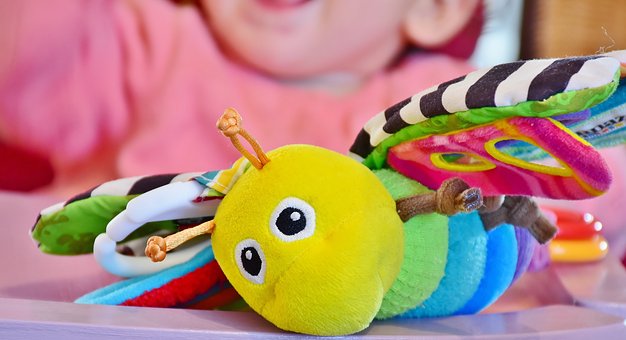
Prerequisites for speech development
Coherent emotional speech consists of the experience of cognition of the external world. All information about the outside world is acquired by children through five senses: vision, hearing, taste, smell, and tactile sensations. For the timely development of the senses, it is necessary to create a rich and meaningful environment.
Toys should be bright, safe, pleasant to the touch, of different textures, and age appropriate. These are, for example, pyramids, rattles, tumblers, cubes, balls, nesting dolls, etc. They should have a variety of textures: plush, fabric, plastic, rubber, wood, cardboard. Designed for different actions: a ball - for rolling, books - for looking at pictures, toys with mirror foil - for familiarizing yourself with your own reflection, etc.
Using the example of a tumbler, we can analyze how a child develops:
* The baby carefully watches how the beautiful toy moves and rolls.
* Feels smooth to the touch.
* Tries to pick it up, but slips out.
* Takes it into the mouth - cool.
* Enjoys listening to how melodious it sounds.
Sensory development is a direct prerequisite for speech development. Based on sensory development, one can assume how speech development will be formed and develop. This will help identify the need for additional development or examination of the baby at an early stage.
How to develop speech in a child?
A favorable speech environment is one of those factors that has the most direct impact on the formation of speech skills and oratory abilities, as well as on the overall development of the child. Therefore, you need to think about how to properly develop a baby’s speech after his birth, because time flies by quickly, and soon you will realize that the child is beginning to pronounce his first words. Now is the time to start developing his speech skills. The best way to do this is to present knowledge in the form of a fun game.
Developing a child’s coherent speech
1.
Try to play games with your baby that involve communication. It’s good if the child has fun with his peers as often as possible. If the baby goes to kindergarten, find out if collective games are held in the group. If the child does not attend kindergarten, you need to take care of how to develop speech before going to school.
2.
We have already said that communication contributes to the development of speech. Therefore, take your child to some section or circle, taking into account his abilities. While doing what you love in the company of like-minded people, your baby will be able to communicate with them and find friends. Of course, this will affect his speech abilities.
3.
To teach a one-year-old child to speak, talk to him as much as possible. If the baby still doesn’t know and pronounce words well, tell him fairy tales, sing songs, read poetry. With older children you can discuss some news, your day, and other topics.
4.
To teach your child to talk more every year, read more. Books allow you to expand your vocabulary and develop the ability to express your own thoughts. So, be sure to read books with your child if he is still small, or buy beautiful and exciting books for your child to read independently. Don’t forget to discuss what you read afterwards - this way your child will learn to express his thoughts as correctly as possible.
5.
If you notice that your child has difficulty pronouncing words or does not pronounce certain sounds, contact a speech pathologist who, with the help of exercises, will help eliminate the speech defect and develop a speech apparatus.
6.
Teach your child to imitate sounds made by animals or inanimate objects (for example, a car, tractor, etc.).
7.
This will improve articulation and develop the speech apparatus.
Classes with your child will help him learn to construct sentences correctly and express his thoughts, pronounce sounds clearly and clearly. In the future, such a person will not experience communication problems. So, do not neglect regular activities with your baby. Moreover, learning with pleasure is easy!
Normal sensory development up to one year
At 6 months . kids perform different actions with objects, for example: shaking a rattle, squeezing a crumb cube, clapping a ball with a pen. At 8 months . They try to hold smaller objects of the educational mat in their hands: various squeakers, small balls, etc. They love to play with their fingers and bring them to their mouth.
According to experts, speech directly depends on the development of fine motor skills of the hands.
Little children at this age observe the movement of objects: a rolling ball, a spinning top, a spinning ball, a rattle swinging overhead.
Listen to music and lullabies. Visual and auditory reactions are selective. They recognize the faces and voices of their loved ones, smile, coo, babble, laugh. During this period of time, hearing and tactile sensations are better developed than other sense organs. There are warm and cold, dry and wet, soft and hard, smooth and rough.
From 7 months, babies begin to react sensitively to extraneous sounds and noises. These are the sounds of an unfamiliar voice, birdsong, the sound of a chair being pushed back, the noise of a passing car, or a flying airplane.
In order to help your baby develop his senses and improve them in the future, the following recommendations will help you:
Recommendations for parents interested in the early development of their baby
- Keep a notebook “This is what we learned before the age of one” and once a month write down what your child has learned
- Create a playing field for your child to accumulate sensory experience and master the simplest ways of operating with toys and objects of different colors, shapes, and sizes.
- Talk to your child in a calm tone. Voice intonations should be gentle.
- Constantly communicate with your baby: sing lullabies, read nursery rhymes, jokes.
- Always smile, supporting his emotional mood.
- Massage regularly, verbally accompanying stroking the back, tummy, legs, arms. Our website has a lot of speech material for the little ones.
- Hug your baby more often, hold him close to you. Hugs help him develop emotionally and feel comfortable.
Positive emotions, live communication, a large number of new impressions - all these are important conditions for the sensory development of a little person.
Speech development from one to one and a half years
At this age, the first words appear. Speech becomes a means of communication. A baby's vocabulary includes up to 20 or more words . The child uses babble, alters some words, the meaning of which is clear to him: car - bi, eat - yum, what - te, this - etya and others. With pleasure, he imitates animal voices and familiar sounds, for example, a car driving, a vacuum cleaner making noise, an airplane flying. A child’s interest in onomatopoeia can be maintained by repeating them verbally with adults. This stimulates the ability to pronounce correctly in the future,
The baby knows the objects that surround him and recognizes them in pictures. He happily responds to his mother’s request to bring a pyramid, spinning top or other toys. Performs simple actions with them: rolls a ball, leafs through a book, assembles a pyramid.
If the adults around the baby have expressive and meaningful speech, then he will learn to speak more easily and quickly. The purity and correctness of the baby’s speech also depends on the sounding speech of loved ones.
How to work with a child
For better speech understanding
- Read fairy tales to children, explaining what actions take place there. After that, ask questions and listen to the children's answers.
- Invite children to look at pictures with different scenes. Answer questions if they arise.
- Play with toys, perform actions with them, while naming them. For example: the car is driving, the doll is sleeping.
- It is necessary to instruct the child to perform certain actions.
To develop correct intonation:
- Repeat words and sentences with the children.
- Teach your child to distinguish between interrogative and exclamatory intonations.
- Ask your baby to repeat words after you at different volumes and speeds.
- Involve the child in educational games for children of different ages, give him the opportunity to communicate more often.
How to teach children to pronounce words correctly:
- It is necessary to ask the child different questions and ask him to answer them. In this game, answer the children’s questions yourself, pronouncing the answers correctly.
- When reading poetry, you can ask kids to finish the phrase by finishing the words.
- Set up a theater. Show children different performances, while paying attention to the pronunciation of words.
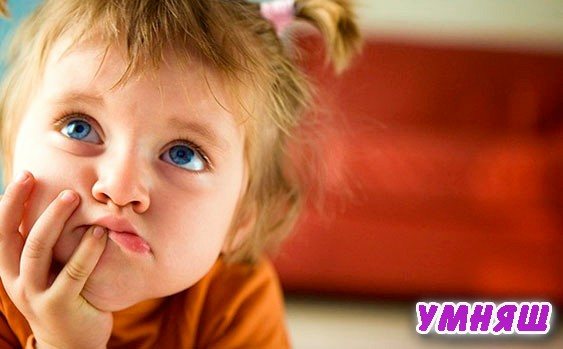
Through games and other activities, you will help children understand the world around them, as well as introduce them to a variety of objects and their purposes.
Developing correct speech: how to quickly teach a child to say the letter “r”? Video - exercises.
Once the speaking skill has been sufficiently mastered, you can move on to reading and writing training. How to teach a child to write correctly without errors is described in detail in one of our following materials.
For mothers who love to knit, we have added new material to the site - how to knit a vest for a 1-year-old child.
Articulation gymnastics
Articulation or speech gymnastics teaches little children the correct production of sounds using their lips, tongue, teeth, and cheeks. Clear speech is an important condition for successful learning in the future. Speech becomes clearer, the number of words spoken increases. You should know that the activity of the brain depends on speech development.
Therefore, everything needs to be developed in the system: fine motor skills, working on diction, breathing, enriching sensory experience and increasing vocabulary.
With the help of this gymnastics, the tongue becomes strong and flexible, speech breathing improves, and children learn to pronounce words correctly.
Important! To ensure that your child enjoys the lessons, all training should be done in a playful way and in front of a mirror.
Pronunciation of sounds
- A - the mother demonstrates her mouth wide open: “Who lives in the mouth - the house, now we’ll see.”
- U – “the plane flies” the lips like a tube.
- And - “Show all your teeth.”
- O – “Round wheel”
To make your voice sound good, you need proper breathing: even inhalation and exhalation. Otherwise, the child will speak excitedly or quietly.
Breathing exercises
- "Blow out the candle"
- “Blow the paper butterfly away”
- “Blow into a straw” (into a glass of water)
Games with a funny tongue
In order for the baby’s tongue to become obedient, it is necessary to play the following games.
- “Once upon a time there was a tongue.” (show)
- “Tongue loved to ride a horse. (click tongue)
- “He really liked the delicious porridge” (lick lips)
- “The tongue looked at the sun” (the tip of the tongue is raised up) And others.
A positive attitude between an adult and a child will increase the level of learning speech development. Systematically conducted game-activities will help consolidate acquired skills.
Imitation games
Goals:
- Through these games, the baby discovers the world around him.
- Learns to perceive oneself in this world.
- Interacts with other people.
Little children imitate adults’ intonation and speech expressions.
Your acting skills will delight your child. Joyful feelings and emotions will help him become an interesting conversationalist and an optimist in the future.
For example, in the game "Airplane"
- “We rock the chassis - pshshh,” stomping alternately with the right and left legs.
- “Rotate the screw - bvvv”, making alternate circular rotations with your hands.
- “Start the engine - rrr” - we wave our hands in front of us.
- “Let’s fly - ooh” - we run on our tiptoes, arms to the sides.
- “For landing - phhhh” - we kneel down, squat down, on the floor.
Poems that encourage the pronunciation of sounds and words
The following poems increase the baby’s interest in the pronunciation of sounds, syllables, and words: “Bear with clumsy feet,” “Once upon a time there was a bunny,” “The little gray bunny is sitting,” poems by A. Barto and others.
Little children especially like “babble rhymes.” The children's attention is attracted by bright colorful illustrations. The poems are constructed in the form of a dialogue. Kids coax individual sounds, words, and phrases. Speaking together increases the child’s emotional mood, develops memory and thinking. We recommend purchasing the book “Chattering Poems” by I. Aseev, it is bright and very useful. Both the child and the parents will like it.
Chattering poems will help your baby speak faster.
Examples of “chatter rhymes”:
- Egorka the hare fell down the hill. - Bang!
Run down the hill and save Yegorka! - Oh!
- Cucumber, cucumber, don’t go to that end - Don’t go!
The mouse lives there. He'll bite your tail off! - He'll bite it off!
- Pussy, pussy, pussy, shoot! - Shoot!
Don't sit on the path! - Don't sit down!
Our Mashenka will go. - Top - top!
It will fall through the pussy. - Bang!
Games for incorporating simple words into speech
By describing his own actions, the adult makes the child want to repeat them:
“This is the kind of locomotive I am, a lot of noise - a hundred wheels. I'm going - I'm going, that - that - that! Chug-chug-chug. In the hole - bang."
“Where are our pens?”
Short description:
To the words: “Where, where are our hands? Our hands are gone,” the baby hides his hands behind his back. When an adult says: “Here, here are our hands.” Here are our hands,” holding them out in front of him with the words: “Here they are!” and claps his hands cheerfully.
You can continue this game by replacing the word “handles” with other parts of the body: “Where are our legs? (ears, eyes, nose, tummy), repeating the appropriate actions.
"A bird sat on the window"
Description;
A bird sat on the window,
Stay with us for a while.
Sit down, don't fly away.
The bird flew away. Ay! (at the word “Ay!” - they clap their hands and encourage.)
“The horned goat is coming” and many others
Kids like to pronounce such words: ah, oh, bang, oh and express them with emotions
(they shout enthusiastically, laugh, stomp their feet, clap their hands).
Speech development from 1.5 years to two years. Avalanche-like leap in vocabulary
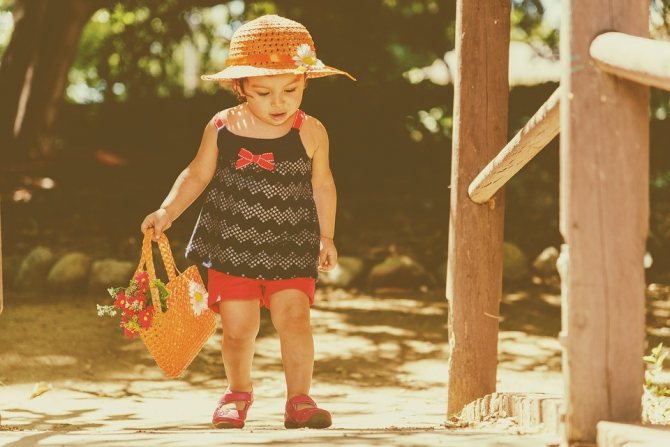
Speech development from 1.5 to two years
At this age, children's vocabulary increases sharply. Systematic games and activities with the baby help increase it to 200-300 words by the end of the year. In addition to nouns, verbs (give, drink) and adverbs (there, here, over there) appear in speech. Gestures and facial expressions are no longer enough for a baby to communicate something or ask for something. He talks a lot and with pleasure.
The child wants adults to understand his actions and help him if he can’t do something on his own (put a dog, which is larger than the car itself, into the cabin; get the necessary item from the shelf). The child combines words into two or three word phrases (dad is coming there, there is a cat). Closer to two years, he begins to speak in sentences of 3–4 words.
We practice understanding and pronunciation of words. Items
A child willingly responds to an adult’s request to bring a certain object, for example, a dog. Easily gets involved in the game: “Here is the dog aw - aw. Where are her eyes? Here are the eyes. Which? Shiny. Where's the nose? Mouth? Paws? Tail? What soft, fluffy fur. The dog is good."
“Oh, what a beautiful turret! High. Our turret is built from cubes. The dog touched it with its paw and the turret fell. Bang! Now we will build a new one. Again the dog broke the turret. Bang! The turret fell."
Acquaintance with a new object begins with examination, familiarization with its properties and purpose.
For example:
- What a bright spinning top. Red berries are painted on it. This is strawberry. Delicious strawberries. Mashenka and I ate in the summer. Strawberries grew in the garden. The spinning top has a leg. Yula can spin on one leg. Let's try to start a spinning top. Spinning.
Zipper. How fast. And the berries are spinning. Yula stopped. Shall we start it again? Whack! Spinning.
- This is the ball we have. Big ball. Yellow, like a bun. Round. The ball can bounce. My cheerful ringing ball, where are you off to? Shall we catch the ball? Let's hit it with our palm! The ball began to bounce again. Jumping gallop! Fun ball. What else can the ball do? Can he roll? Let's take a ride through the gate? Rolled! Rolled through the gate! Roll towards our Mashenka, big round ball! Where is our little ball? Here he is! Mashenka brought it! Can you, little ball, jump and roll? Show me, Mashenka, where the big ball is. Show how big he is! Where's the little ball? Show me how small he is.
The baby has already learned to respond to a word, to understand a question addressed to him. For example:
- Let's look at the vegetables in the picture: What is this? Carrot. Who loves her? Bunnies. Who else? Mashenka. Carrots can be chopped into soup. Cook delicious cutlets from carrots. Mashenka loves carrots. What is she like? Orange, delicious. And what's that? Tomato. Red. Round. Did Mashenka eat a tomato and cucumber salad? Delicious salad.
Now, Mashenka, show the picture and ask what it is? Is this beets? Yes? Of course, beets. Mashenka and I rubbed it on a grater. Oh, what delicious beets!
How speech is formed
Speech becomes more complex gradually: from the first expressive cry to “humming” and babbling, from the first words to utterances. In the period from one to two years, short sentences appear, usually of an everyday nature. And from two to three years old, the baby begins to learn how to communicate with people around him. It is the parents who become the main ones in this process, although sometimes consultation with a speech therapist, neurologist, or defectologist is required. As a result, either you will work with the child yourself, following the recommendations, or the doctor will constantly monitor him and personally carry out appropriate measures.
Speech is such a complex process, closely related to thinking, memory, and the ability to perform actions, that it would be a big mistake to let it take its course. Doctors are convinced that if a child does not speak at the age of 3, this is a parental failure. Those who believe that the child will “still talk” are mistaken - this can only happen if he is taught.
Ideally, it is better to accustom your baby to his native language before birth, because he reacts to sounds already in the second third of his mother’s pregnancy. At this stage, songs and pleasant music, reading aloud, as well as ordinary, but always personally oriented, “conversations” have a beneficial effect.
Why doesn't a 3 year old child talk? There are factors that influence speech development in utero and after birth:
- nature of pregnancy;
- features of the birth process - rapid or premature birth, hypoxia (lack of air) or asphyxia (suffocation), etc.;
- diseases suffered before the age of one year.
If abnormalities are found during the examination, but you are ready to follow the doctors’ instructions, everything can be corrected, it will just take more time, effort, and patience. The latter is especially important: after all, a child may not speak at the age of three, even when all the conditions seem to have been created for communication.
There are also quite ordinary, not physiological, but external causes of speech delay. They may be associated with a change in lifestyle (for example, moving) - getting used to new circumstances, children seem to put off speaking until later. “Inhibition” also occurs when parents spend little time with their children or leave them in the care of the TV, electronic toys and devices.
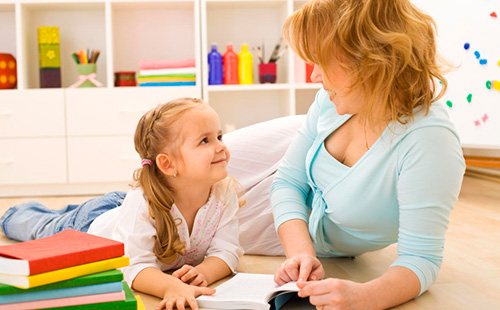
What to do if the child does not start speaking at 3 years old
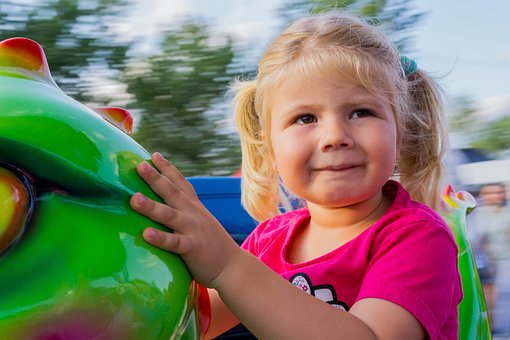
What to do if the child does not start speaking at 3 years old
The cause may be social, educational or psychological problems. The child may have experienced severe stress. A visit to a pediatric neurologist, psychologist, psychiatrist, or speech therapist will help identify and eliminate the causes of speech impairment.
Speech therapist advice
- Constantly communicate with your baby.
- Speak clearly and not hastily.
- Repeat words and phrases many times.
- Speak out loud all your child’s emotions and actions
For example: “Sasha, you’re crying because you tripped over the typewriter and fell. Come on, mom will stroke your leg, take pity on Sasha: “The pussy is not in pain, the dog is not in pain, and Sasha will heal!” And we will lift the car and remove it from the path. Machine, don’t go under Sashenka’s feet. Sasha, look carefully at the path when you run, to see if your feet will step on a car or another toy. Fine?"
- Voice any situation.
- Always be in a good mood.
- Support the slightest attempts to communicate.
- Keep a diary of new actions, words, sentences, which were mentioned earlier.
Conclusion:
There is a unique means for developing a personality capable of achieving success in any field of activity.
This is early development. Thanks to early development, you provide your baby with the opportunity to learn about the world through play, accumulate impressions, and expand his vocabulary.
Learning while playing is continuous, painstaking, but joyful work. Let your child see how interesting it is to learn.
.Early development does not deprive a child of childhood, but turns every day into a meaningful, rich, bright and cheerful holiday of childhood.
Don't waste time. It is at this age that the brain and speech functions develop rapidly.
Don't wait for three years, develop your baby today.
I wish you success!
If you liked the article, please share a link to it
How to teach a 3-year-old child to speak well?
The desire of parents to ensure that their child develops correctly in all respects is quite understandable. Every mother and father wants their baby to be a well-rounded person, happy and healthy. In this situation, everything depends not only on the information embedded in human genes. What is inherent in nature must be constantly developed.
The development of a child occurs in stages, he learns everything gradually: to speak, walk and much more. Parents are often concerned when a baby develops inappropriately for his age. When it’s time to talk, parents eagerly await the child’s related phrases and questions.
In the previous material, you have already read the article on how to help a 9-year-old child read quickly, now let’s talk about the speech of a three-year-old child.
Note! Delayed or impaired speech development at this age may be associated with serious disorders that require referral to specialists. Read more about them in the article why a child does not speak at 3 years old.
In many cases, you have to wait a long time because every child is different. They have different characters and temperaments, some are more reserved, while others, on the contrary, are sociable. Therefore, it is too early to immediately say that a child is developmentally delayed if he is not yet speaking. You just need to help children do this.

